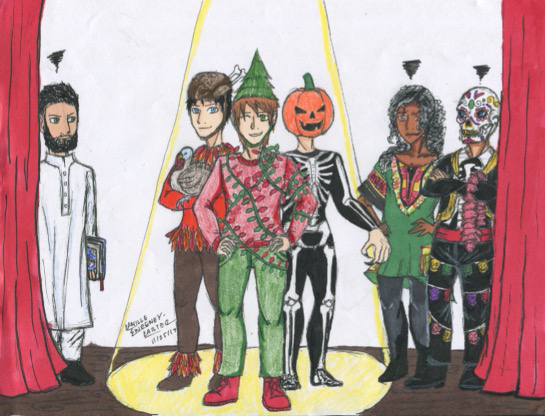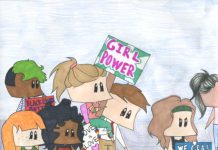By Camille Sweeney-Carter

When most people are asked to name a holiday, popular responses are “Christmas,” “Thanksgiving,” “Halloween,” “Easter,” or “Valentine’s Day.” Though these holidays bring people together and are widely celebrated all over the world, they completely drown out other holidays, which are equally significant in other minority cultures in the United States.
People love to shop for the holidays. Stores like Target and Walmart are flooded with customers who want to get their hands on festive decorations that will make their houses stand out. This occurs especially around Halloween and Christmas because stores never seem to have a shortage of spooky skeletons or wreaths. But, what if someone didn’t need those decorations because he or she was celebrating a different holiday? It’s not as if they can go and buy decorations from their local store because those places all too often don’t have the items needed.
When a person thinks about holiday songs, it is doubtful their first thought is a song about the wonderful celebration and traditions of Kwanzaa, Day of the Dead, or Hanukkah. The reason is very simple. There aren’t many, if any, songs about these holidays played where everyone can hear them. For example, the station “Sunny 106.5”, a local Las Vegas radio station, begins to play Christmas music after Thanksgiving and all the way through Christmas Day. They have jolly tunes 24/7, but not once have they played any songs which don’t have something to do with Christmas and only Christmas. This means they have overlooked all the other equally important holidays that occur around the same time. It is not just this particular station that has neglected to play other tunes, however; many stations do. It is not often that someone will hear a song pertaining to Kwanzaa playing in their local supermarket.
It is the same with movies and television. At least in the U.S., most holiday movies are not about any of the minority cultures’ wonderful celebrations. Halloween, Thanksgiving, and Christmas dominate most of the holiday programming. As a solution to this issue, a television company could be the one to create a program about a less recognized holiday. Pop culture and mainstream media often overlook holidays such as Kwanzaa, Ramadan, and Day of the Dead.
Kwanzaa celebrates African-American culture over the course of seven days, beginning Dec. 26 and ending Jan. 1. This week-long holiday is fairly new; Dr. Maulana Karenga, professor and chairman of Black Studies at California State University, created it in 1966. Karenga wanted to bring African-Americans together as a community after the Watts riots in Los Angeles, California.
The idea of Kwanzaa was supposed to unite African-Americans when so many felt scared and out of place in their own country. Kwanzaa doesn’t have a specific code of conduct, but the most common traditions include: African drums, storytelling, songs, dances, and a feast. Each night, one person in the family, usually a child, lights on of the candles on the Kinara. The one in the center is lit first as the family celebrates one of seven principles each night with the lighting of one of the candles. The principles, called the Nguzo Saba, include unity (Umoja), self-determination (Kujichagulia), collaboration and responsibility (Ujima), cooperative economics (Ujamaa), purpose (Nia), creativity (Kuumba), and faith (Imani). It is important to recognize Kwanzaa because it represents the African-American community and how they’ve come together after so much racial oppression in the past. Understanding what their community celebrates can help the human race recognize each other’s interests a bit more and emphasize the fact that racism and bigotry need to remain in the past.
Unlike Kwanzaa, Ramadan is a holiday that is rooted in religion.
Islam has over one billion followers, making it the second largest religion in the world after Christianity. One of the biggest holidays of the peaceful religion is Ramadan. This holiday occurs during the ninth month of the 12-month Islamic calendar. It is based off the phases of the moon rather than the solar calendar. As a result, Ramadan does not have a set start date, but instead begins on a different day every year. In 2018, it will last between the sunsets of May 15 and June 14.
Each day during Ramadan, Muslims avoid any impure thoughts or actions. Ramadan promotes self control, self reflection, and self restraint, which is believed to be a way to cleanse the soul and sympathize for those who are less fortunate. Eating is strictly prohibited from sunrise to sunset. During the day, Muslims take care of their usual activities, such as working and going to school, although some make the effort to read the entire Quran, attend mosques more frequently, and say special prayers. There is a big feast every sunset, but at the end of the holiday, an even bigger celebration called the Eid al-Fitr, or the Feast of Fast-Breaking takes place. It starts the day after Ramadan and lasts for three days. During this time, friends and families gather to eat, say special prayers, and exchange gifts. The self-control Muslims show is admirable.
Other holidays also promote reflection. El Día de los Muertos, or Day of the Dead, is a holiday of remembrance for those who have left this world. It is a holiday primarily celebrated in Mexico, although Latin Americans and Hispanics recognize it in the U.S., as well. Hispanic and Latino Americans are the largest ethnic minority in the U.S., making up 17.8 percent of America’s population.
Day of the Dead begins on Oct. 31 and ends on Nov. 2, and allows families to honor their loved ones who have passed away. Hispanics and Latinos that celebrate this holiday believe that the dead return from the afterlife on the same night as Halloween. To help the deceased find their way back home, families often light candles and incense. They create altars and decorate their loved ones’ graves with flowers, brightly-colored skulls and skeletons, garlands, photographs, candy, and samples of the deceased’s favorite food and drinks. A wash bowl is also included so that the spirit can clean up before digging into the meal. Gravesites are tidied up for this holiday, and relatives often paint the resting places. Families gather around the gravesite to have a picnic and reminisce about their loved ones. Day of the Dead is a holiday full of warm memories of those long gone.
Holidays such as these are definitely overshadowed by other celebrations in America. They do not receive the same attention and mainstream popularity in the media because they are very culturally different from those many Americans practice. It is still important, however, to understand other cultures and beliefs in order to become a more unified and tolerant society. The more people understand each other, the more they can learn from one another and grow as human beings.











